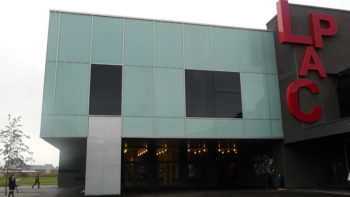On March 16 2020, the theatre industry came to a standstill. Hit devastatingly hard by the Covid-19 outbreak, anxiety spread like wildfire among the theatre community.

Technicians, performers, and box office attendants alike were forced to go home, leaving their jobs behind them, uncertain about what their futures would hold.
As the world situation remains precarious, the majority of theatres still remain non-functioning.
Local theatres have been hit particularly hard by this crisis including Lincoln Drill Hall, as it has recently been announced that the Lincoln Arts Trust’s Service Level Agreement will not be renewed by Lincoln Council, which escalates prevalent concern about the pending future of theatre and arts organisations post-pandemic.
Craig Morrow, artistic director of The Lincoln Performing Arts Centre (LPAC) has opened up about how the arts organisation, which provides opportunities for creative exchange between artists, audiences, students and academia, has been affected by the coronavirus.
Mr morrow explained: “Four hundred years ago closures in the event of plague were a common enough occurrence for theatres to be able to react to maintain livelihoods, but in 2020 there’s no option for our staff to take to the road and tour shows to stately homes.”
“As a presenting venue, we are largely reliant on touring theatre companies coming to us and we only have small departments designed to support touring work, not produce our own events.”
“Consequently, our ability to respond to the pandemic creatively has been limited.”
“Like many venues where possible we have furloughed staff and stripped everything back to a skeleton operation. This is set to last into next year,” he added.
Whilst the government has announced a £1.57bn support package for the arts industry, Mr Morrow believes this is “too little, too late.”
“Many organisations have already entered into redundancy consultation and the value of the fund, when broken down is not enough to sustain the existing ecology,” he said.
“Lincoln Performing Arts Centre is part of University of Lincoln and at time of my response the university has confirmed that it will apply to the fund, but there is no guarantee that they will be successful.”
Additionally, the government have also given the green-light for the phased reopening of theatres from 15th August although, this is not feasible for many theatres, including LPAC.
“Although we welcome the Government initiating steps towards the reopening of theatres, like most venues, LPAC is entirely reliant on ticket sales and traded income to cover the cost of its operations and it is simply not possible to deliver the same scale of activity this year with social distancing in place,” Mr Morrow said.
“The lack of a timetable for re-opening from central Government without social distancing, combined with the very real possibility of having to cancel productions in the event of a second wave or local lockdown as we move into the autumn/winter season, makes long term planning particularly precarious”
“The level of investment required to produce events such as PopOut Festival or our family Christmas show, are simply too great a risk,” he added.
However, whilst LPAC will not be fully reopening until Spring 2021 at the earliest, the contemporary arts organisation is adapting.
“In the meantime, we are thinking about how we can start to produce socially distanced pop-up events that are relatively low risk,” said Mr Morrow.
“We are determined to find creative ways to present performance and cultural events that work within COVID Safe guidelines and I have been really energised by the possibilities.”
“From small-scale shows specially adapted for social bubbles, to outdoor installations, to digital work, there is a wealth of opportunity to explore how we can continue to share live experiences – it’s actually quite exciting!” he added.
The LPAC’s revised programme includes a reimagined Christmas show- A Distant Christmas. This alternative to the yearly main-stage Christmas show will take audiences around the city, merging Augmented Reality technology with live performance, consciously offering a festive story in a safe and engaging format.
The ability demonstrated by LPAC to adapt just goes to show that theatre is an essential part of our culture, and it would be devastating for us if we were to lose it.
When this pandemic eventually ends, our theatre industry will undoubtedly make an incredible comeback.
Whilst for the foreseeable future, theatres remain closed, the magic is still there, waiting to captivate its next audience member, although at least for now, this magic will remain relative to a safe, social distance.

